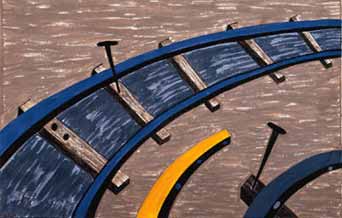Students studied the art and sketched the parts they wanted to remember.
For me, the most exciting part was taking them to the special exhibit One-Way-Ticket: Jacob Lawrence's Migration Series. Lawrence is from Harlem, and MoMA put out an amazing book about him to go with the exhibit called Jake Makes a World.We read the book (available here) in preparation.
Students loved interacting with the panels, even while the text was above what they could read. When I announced to my class that there was one minute left, one of my boys raced over to a new panel and attempted to draw it because he so desperately wanted "to sketch one more."
Their sketches really impressed me. Here are some along with the original work of art.






